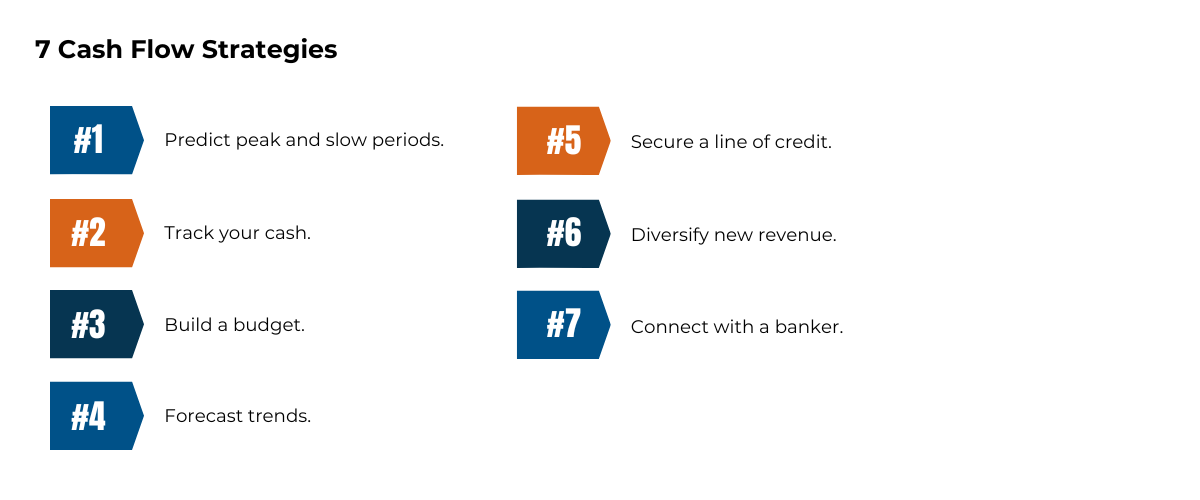
In the small business world, there are various types of companies that make a significant portion of their profits in only one or two seasons of the year. Examples include holiday retail stores, summer tourism enterprises and agribusiness. Many of these seasonal businesses remain open or provide services throughout the year, adjusting to the difference in traffic or customers. However, seasonal businesses experience unique cash flow challenges compared to traditional small businesses. Revenue can surge during peak seasons and fall during off-peak periods. But, it doesn’t mean you’ll have zero cash in the offseason.
Your business can remain profitable throughout the year with careful planning and the crafting of a robust strategy for cash flow management. In this article, we’ll discuss key strategies and tactics to help you effectively manage your cash flow as a seasonal business. By being proactive, you can ensure stability during lean periods and sustainable growth when the busy season returns.

Holidays, tourism and agricultural cycles can all significantly impact your business's cash flow projections, profitability and overall success. Understanding the seasonality of your business is essential. Identify when your peak sales periods happen and when your business will slow down. During peak times, you can build up your cash reserves and allocate resources for increased production, marketing and staffing. By stashing and saving during peak times, you’ll have a cushion during slower periods to reduce costs and overextension. During the slow season, you can focus on strategizing, setting goals and training employees.
Creating a solid business financial plan is an important step to better manage your peak and slow times. It helps you put your thoughts to paper and stay on track to get through the off-season. Consider running your business idea past a Northwest Bank commercial banker, who is familiar with all types of businesses in various markets and can provide free planning advice. There are also a number of software options and templates available through the Small Business Administration (SBA) Small Business Development Centers. The Small Business Development Centers are staffed with individuals who can help you create your business plan at no cost.
Understanding how to manage cash flow as a small business is critical, but it is especially important if you are a seasonal business, due to the unique revenue patterns. Positive cash flow means you’ll have money to cover payroll, equipment purchases and upgrades, loan repayments and other key business needs. But, if you have negative cash flow, you may be unable to pay your employees and vendors, cover your monthly rent or have the money needed for any other daily business costs. Creating a projected cash flow statement that covers the entire year, breaking it down by month or week during the peak season, can help. This projection should include all sources of income and expenses. Review your balance sheet to determine the difference in value between current working capital assets and liabilities. By forecasting cash flow, you can anticipate cash flow for better planning.
A detailed budget serves as a roadmap for your business throughout the year, especially during the off-season when funds can be limited. Your budget should cover all aspects of your business, including operating costs, fixed expenses and investments. Don’t forget to take into consideration inflation, profit margins and markups. By adhering to a budget, you can control spending and make informed financial decisions. Remember that your business will evolve, so you should always revise your budget and plan annually.
Accounting software like QuickBooks can help you more easily manage your finances, invoice your customers, pay bills, generate reports and much more — so you can better track your profitability and cash flow.
Develop cash flow forecasts that extend into the future, ideally covering at least the next 12 months. Regularly compare your actual cash flow with your forecasts to identify any discrepancies. If you notice potential shortfalls, you can proactively address them by reducing expenses or securing additional seasonal funding.
Also, research the competition. Others often consider competition a bad thing, but it can be a great motivator for seasonal companies. Are there businesses in your area offering similar products and services? If so, look at what others offer and see if you can add a value or solution they don’t provide. Attending workshops or networking events can help you learn more about others in similar industries.

It's a good idea to establish a business line of credit or secure a small business loan to help with cash flow challenges. This proactive approach ensures that you have access to funds when you need them, whether to cover operational costs during slow periods or seize growth opportunities during peak seasons. A Northwest Bank commercial banker can set up these financial arrangements in advance. Many times, the terms on debt can be flexible depending on your business’s cash flow. For instance, you might set up heavier payments during your busy time and then switch to interest-only or annual payments in the off-season to balance your cash flow and expenses.
Relying solely on one product, service or customer segment can be risky as a seasonal business. Consider diversifying your income streams by expanding your product or service offerings in the off-season or targeting new customer segments. This can help stabilize cash flow by reducing your dependence on a single revenue source and opening up new opportunities.
Your business banker can guide you in planning for your seasonal business. They can discuss your business financial plan, budget and financial projections, as well as any potential financing options. Your banker can help you assess the financial feasibility of your business and give advice on funding options, such as small business loans. Meeting with your accountant on other budget strategies before tax season is also a good idea. There may be ways to offset your income with tax write-offs. A banker’s expertise will enable you to make informed decisions, mitigate financial risks and ensure that your seasonal business maintains financial stability year-round.
Contact our team of business bankers today to learn more about how Northwest Bank can help position your seasonal business for long-term success during both peak and slow times.
Experience the Northwest Bank difference--the better banking experience. Contact us today and let's build a brighter financial future together!
Mon - Fri: 7:00 AM - 7:00 PM CST
Sat: 8:00 AM - 12:00 PM CST
General Support: 800-678-4105